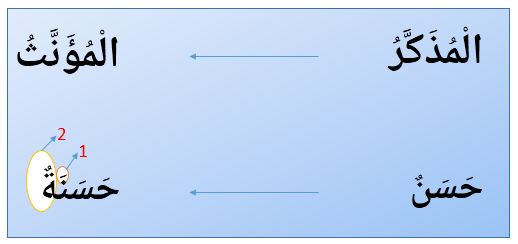The three classification of a Noun in Arabic: mudhakkar & muannath
Table of Content [View]
Have you learned definite noun and indefinite noun in Arabic? I suggest you to read the lesson again then start reading this lesson.
Today, I will explain you about two genders in Arabic, they are the masculine and the feminine.
The masculine and the feminine Gender in Arabic Language
The masculine in Arabic is : الْمُذَكَّرُ (al-mudhakkaru)
The feminine in Arabic is : الْمُؤَنَّثُ (al-mu annathu)
الْمُذَكَّرُ (The masculine Gender)
A noun is assumed to be masculine if they are:
1. Words masculine by meaning
Examples:
a. The man's name, such as: أَحْمَدُ (aḥmadu), عَلِيٌّ ('aliyyun), etc.
b. The thing masculine by meaning, such as: وَلَدٌ (waladun) means a boy, رَجُلٌ (rajulun) means a man, etc.
2. Nouns which don't end in feminine suffixes (ة)
Examples:
- كِتَابٌ (kitaabun): a book
- مُدَرِّسٌ (mudarrisun): a teacher
- كُرْسِيٌّ (kursiyyun): a chair
Note to point number two
There is an exception in this point.
Although some nouns end with feminine suffixes ( ة ), they are still masculine, such as:
- أُسَامَةُ (usaamatu): this is a man's name, so this is a masculine noun.
- خَلِيْفَةٌ (khaliifatun): caliph
How to change masculine into feminine?
You can make it by performing these steps:
1. Change ending harakat into fat-hah.
2. Add ta marbuta (ة) after it.
Examples:
- ابْنٌ (ibnun) means son => this is a masculine noun.
The feminine noun => ابْنَةٌ (ibnatun) means daughter.
- حَسَنٌ (handsome) => حَسَنَةٌ (beautiful/pretty).
Special notes (noun which can be masculine or feminine)
Some nouns are used as both masculine and feminine, for examples:
- بَلَدٌ (baladun) : country
- نَفْسٌ (nafsun) : individual; person; soul
- رُوْحٌ (ruuḥun) : spirit
- حَالٌ (ḥaalun) : condition
- سُوْقٌ (suuqun) : market
- سَبِيْلٌ (sabiilun) : path
- إِصْبَعٌ (iṣba'un) : finger
الْمُؤَنَّثُ (the feminine gender)
Noun is assumed to be feminine if they are:
1. feminine by meaning even if they don't end with feminine suffixes
Examples : زَيْنَبُ (zaynabu), مَرْيَمُ (maryamu), etc.
2. Noun ending in the feminine suffix (ة) or ta marbutah.
Examples:
- مُدَرِّسَةٌ (mudarrisatun): a female teacher.
- غُرْفَةٌ (ghurfatun): a room.
- سَاعَةٌ (saa'atun): a clock.
3. Noun endings in alif maqsuurah (ى)
Examples:
- حُسْنَى (husnaa) means : kindness; good
- صُغْرَى (ṣughraa) means: small
4. Noun ending in alif mamduudah (اء)
Examples:
- زَهْرَاءُ (zahraa-u) means: bright; shining; blossom.
- صَحْرَاءُ (ṣaḥraa-u) means : desert
5. مُؤَنَّثٌ سَمَاعِيٌّ (mu-annath samaa'iyy).
mu-annath samaa'iyy means feminine in accordance with usage.
mu annath samaa'iyy includes these nouns:
a. The names of cities, countries, tribes.
Examples:
- مَكَّةُ (mecca) : name of a city.
- مِصْرٌ (miṣrun): name of a country -> Egypt
- قُرَيْشُ (qurayshu): name of a tribe.
b. Parts of the body which are in pairs.
Examples:
- عَيْنٌ ('ainun) : eye
- أُذُنٌ (udhunun) : ear
c. Some elements of nature.
Examples:
- سَمَاءٌ (samaa-un) means : sky
- شَمْسٌ (shamsun) means : sun
- أَرْضٌ (arḍun) means : earth
6. Others
- حَرْبٌ (harbun) : war
- فُلْكٌ (fulkun) : ship
- سِكِّيْنٌ (sikkiinun) : knife
- دَارٌ (daarun) : house
- عَنْكَبُوتٌ ('ankabuutun) : spider
- نَارٌ (naarun) : fire
================================================



No comments:
Post a Comment